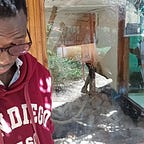The Best Breakthroughs Stem From Personal Frustrations
The Art of Innovation
Some of us are born futurists, with the ability to predict trends “accurately”; make something out of it and hopefully profit in the process. Such people are rare to be honest. Others are lucky to pick up trends based on data (Jeff Bezos realised that the internet was growing at 2300% monthly and sort after a piece of the pie). For most of us, however, entrepreneurship or innovation springs from frustration with the current product or process of delivering the service. Frustration here might be price, poor quality, poor customer experience et cetera — point be, it is personal for each of us.
Entrepreneurs Out Of Necessity: A Few Rule Breakers
For eons, huge corporations such as Microsoft, IBM and even Apple dictated the way software was developed and protected. It was always thought of as intellectual property and as such giving away the code to your new software was unheard of — the act likened to giving away the combination to your secret vault. Software belonged to the individual or company that developed it, and that was the norm.
In the early ’90s, Linus Torvalds, a twenty-one year old computer science student at the University of Helsinki, grew frustrated by the high prices of operating systems. Because he couldn’t afford one, he spun out his own.
On his quest to building Linux, Torvalds highly disrupted the status quo. His goal was to build “a cool” operating system for the world — for free. He was well aware that he could not do this alone, and so he released his Operating System as “open source” software — one which thousand of other motivated and talented programmers could build and improve upon.
“Legend” has it that a professor who had a competing operating system philosophy told him that his plan was an “error” and that if he was in his class, Torvalds would not “get a high grade for such a design”. Cocky at the time, he sent back an e-mail “That’s OK. Einstein got lousy grades in math and physics.”
Today Linux boasts of more than ten million users and is one of the best operating system in the world, right up there with Windows and Macintosh OSX. That blend bravado, determination, and frustration displayed by Linus made the huge corporations change their minds about “open source” software, initially considered unreliable and fringe.
But that is just one story. The world is full of men and women, who out of frustration decided to instead innovate or improve on an already existing situation or product.
McDonald’s USP was their “Speedee Service System” which was the one that churned them profits. The brothers put the fast in fast-foods. Why was it an innovation? At the time, food took so long to get ready and McDonald’s brand promised great quality food in a fraction of the time most other joints delivered.
Virgin Atlantic was born because it’s founder, Richard Branson, loathed the way airline companies dehumanized their services. Steve Wozniak created Apple because at the time, IBM computers were expensive.
Even back at home, we have stories of people who became entrepreneurs out of necessity. For instance, Danson Muchemi started JamboPay because PayPal did not (and still does not)provide local payment gateway to process payments for his then e-commerce startup. Safaricom triumphed over Kencel because it offered better alternatives ( Bamba 100, 50 and later even as low as 10) when Kencel’s smallest airtime was going for five hundred kenyan shillings.
“Opportunity lies in the place where the complaints are.” — Jack Ma
Personal testament
Most of the “ideas” I usually come up with revolve around the fact that I feel there is a better, cheaper, or simpler way of doing things. We recently launched Roometo, an online market place that links university students with private hostels and student accommodation.
If you have studied in any Kenyan public university like I have, then the problem of getting accommodation is akin to you. Put simply, universities in Kenya cannot accommodate all it’s students — a problem that is gradually compounding everyday with the number of students getting into higher learning institutions increasing exponentially. We tried to solve this problem, because it is a personal pain to not only us but also a lot of students in Kenya.
Every solution we have ever worked on has been inspired by what we felt was a gap in the way things were being done. We have failed in some of these endeavors, but that does not mean we have not learned. Opportunity does after all favor the bold.
Cessation
Are you frustrated about how a given product does not meet standards or how a given service is being rendered? Do you feel you there is a better way of doing things? Your probably right. And the solution does not have to be a technical one either. It might be as simple as just improving on the way clients are handled at the counter or the speed in which they are served. If you are lucky, more than one person (you) will be frustrated by the situation and you’d have probably landed yourself a business opportunity. You don’t need to look that hard, a lot of things can be improved on if you ask me — trust me.
